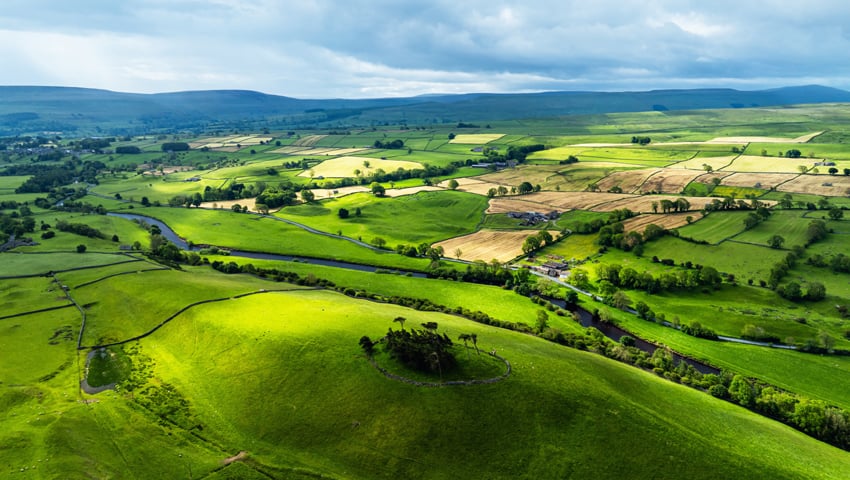A programme to enable supply chains to reward farmers for reducing greenhouse gas emissions is now open to farmers.
Developed by Soil Association Exchange, the new Exchange Market will operate as an insetting fund without any sales of carbon credits. Instead, it will pool funds from a range of companies with shared supply chains to pay farmers to reduce emissions.
Support to develop the scheme has been given by Lloyds who have helped to convene key retailers and landowners including the Co-op, Lidl, Tesco and the Church Commissioners for England to contribute to the fund. The fund has been co-developed with technical experts Finance Earth.
The fund has also been devised in close and ongoing collaboration with a farmer steering group and farmers will receive funding for cutting emissions by adopting action plans that work for them. These plans will be led by the farmer and put together with the support of Soil Association Exchange (SAX) expert advisors and could include actions such as reducing fertiliser usage by introducing nitrogen-fixing companion crops, better fuel efficiency or investing in solar.
Rewards for farmers who reduce emissions
The new Exchange Market will reward emissions-reduction, though in the future the mechanism may be used to reward improved overall carbon cycling as well. A SAX spokesperson said, “Currently, payments under Exchange Market are based on reductions in greenhouse gas emissions – rather than on emissions minus sequestration – however, this may evolve in the future as the pilot progresses.”
Farmers will be rewarded at £60 per tonne of CO2e reduced, calculated against emissions reductions from their initial baseline, obtained via Farm Carbon Toolkit (FCT).
- 50 per cent of the payment will be provided upfront, based on the estimated reduction outlined in the farmer’s emissions reduction plan.
- The remaining balance will be paid upon completion of activities and verification of actual reductions achieved through a second, end-of-year assessment via FCT.
The spokesperson said, “To allow flexibility for farmers to choose what is right for their farm, payment levels are based on emissions reduced by the farm, rather than on undertaking specific actions. [They] are free to choose any practice or action that can be modelled through FCT for emissions reductions – these might include reducing fertiliser usage, using less fuel, adopting minimum tillage practices.
“Additional maintenance payments of £10-£20/ha are also available on enrolment for farmers who are already achieving lower emissions than a typical arable farm (2.05t/CO2e/ha) – so long as they also commit to undertaking further emissions reductions actions via Exchange Market.”
Payment agreements through the Exchange Market are annual and participating farmers have the opportunity to engage with a trained SAX farm advisor before entering into an agreement. At the start of the process, an advisor will work with each farmer to review different options and scenarios that may be suitable for their farm, and develop an achievable emissions reduction plan (which estimates how much CO2e they will reduce). They will then be paid 50 per cent of the estimated reduction upfront. The remainder will be paid upon completion of activities and submission of associated evidence/documentation (i.e. at the end of the year, they submit an updated carbon reduction assessment using FCT again). Payments will be based on verified impact.
The scheme is designed to allow flexibility with 1-year contracts. Farmers have the option to repeat annually, so they can continue to earn rewards for sustained improvements beyond your original baseline. This is where the maintenance payments come in.
All participating farms must have undergone a full SAX baseline assessment, encompassing six key impact areas: healthy soils, carbon emissions and sequestration, biodiversity, water, animal welfare, people and society.
Soil Association Exchange Chief Executive, Joseph Gridley, said, “Exchange Market is about creating real, measurable change within farming systems while empowering farmers to make decisions that work for them. This carbon insetting programme demonstrates that delivering true environmental outcomes can go hand in hand with financial resilience when farmers and businesses collaborate to build a sustainable future for food and farming.
“It represents a major step forward in aligning farming activities with climate goals and demonstrates the power of what can happen when businesses and farmers work together. Collaboration like this enables greater scalability, affordability, and ultimately more impact in reducing agricultural emissions and advancing positive environmental outcomes.”
Elizabeth Beall, Managing Director from Finance Earth, technical experts on the scheme said, “Mobilising private capital to address the climate and nature emergency is critical to speed up action. Farmers are on the front lines and should be remunerated for the work they have done and incentivised to do more. We’ve designed a mechanism which enables both to happen – private finance is mobilised, farmers get paid, while businesses can share costs in reducing emissions in their supply chains.”
Find out more about current and future funding rounds
